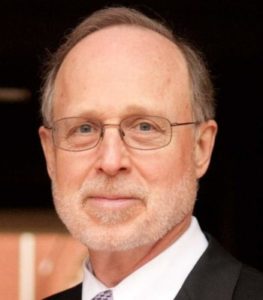“I just ran into some weirdos in the airport,” Uncle Eugene reported. “You know, the kind with their heads shaved except for a little ponytail at the back.”
“I think they’re Hare Krishna,” I said.
“Well, whatever,” Uncle Eugene continued in his slow Texas Panhandle drawl, “I said, ‘Are y’all Southern Baptists?’ They said they weren’t, and I said, ‘Well, you ought to be.”

Alan Bean
Since the end of the great Depression, Southern Baptists had been growing like topsy and showed no sign of letting up. Missions and evangelism were denominational hallmarks. The goal was to win the world for the Southern Baptist Jesus.
This brand of denominational pride was on full display in 1975 when I drove the 2,000 miles from Edmonton, Alberta, to Southern Baptist Theological Seminary in Louisville, Ky. There were more Baptists in the three biggest Louisville churches than could be found in the four western provinces of Canada. In those days, everybody was talking about the Southern Baptist Convention’s Bold Mission Thrust, a plan to proclaim the gospel to every person on earth by the year 2000. This wasn’t a cooperative strategy; the SBC intended to do it all by themselves. Because, if folks weren’t Southern Baptist, they ought to be.
Most of my professors had issues with this triumphal vision. The SBC had been created, they told me, so that enslavers could be missionaries, and the seminary’s founders had been slave owners. The SBC had defended slavery and Jim Crow segregation and opposed the Civil Rights Movement.
A few years after I returned to Canada, civil war broke out in the SBC. Baptists appeared to be fighting over the right way to interpret the Bible. But the real problem was that the denomination was losing its mojo. How could you win the world for the Southern Baptist Jesus if preachers and professors were riddled with self-doubt? The suggestion that white Baptists in the South could learn a lot from the Black churches, Methodists, Roman Catholics, Jews and even women was a confidence buster.
“The real problem was that the denomination was losing its mojo.”
By the time I returned to Southern Seminary in 1989 for doctoral work, my old professors were gone or on their way out the door. Soon Southern Seminary was dominated by Albert Mohler. He was only 33 when he became seminary president; but he was an old-school Baptist determined to rid the school of liberals and uppity women.
But even Mohler didn’t believe the SBC had gotten everything right. In 1995, on the denomination’s 150th anniversary, he helped draft a detailed resolution calling Southern Baptists to repentance. “Some Southern Baptists,” the statement said, had operated under the false belief “that racial prejudice and discrimination are compatible with the gospel.”
“We lament and repudiate historic acts of evil such as slavery from which we continue to reap a bitter harvest,” the statement said, “and we recognize that the racism which yet plagues our culture today is inextricably tied to the past.” The Resolution on Racial Reconciliation concluded with a plea for forgiveness, “acknowledging that our own healing is at stake.”
Since Bold Mission Thrust was announced in 1976, SBC membership plateaued. Next came a slow but agonizing numerical decline. Southern Baptist funerals were beginning to outnumber baptisms. Reaching out to Black Baptists wasn’t just good for growth stats, it countered the traditional identification of the SBC as a bastion of white supremacy.
“Reaching out to Black Baptists wasn’t just good for growth stats, it countered the traditional identification of the SBC as a bastion of white supremacy.”
Still, questions remained. If the SBC had been wrong on race, maybe it had been wrong about the role of women and gay rights. The denomination’s founders had used a literal interpretation of the Bible to defend slavery and white supremacy. If racism was inconsistent with Christian witness, maybe a theology invented to defend it was suspect. Had Mohler and friends thought this thing through?
In 1998, just three years after Mohler drafted the resolution on race, he was asked by Larry King if his stance on race was inconsistent with a rigid insistence on biblical inerrancy. Mohler replied that the Bible clearly requires slaves to obey their masters. If slavery were still the law of the land, he argued, Christian slaves would be bound to that teaching.
But what about Harriet Tubman, King asked. Did her successful efforts to smuggle enslaved persons out of Dixie violate a biblical mandate?
Mohler wouldn’t back down. There are no loopholes, he said. (Last year, when pressed about his comments to King, he called them “stupid” and said, “I repudiate the statements I made.”)
When Black SBC pastors had problems with Donald Trump, Mohler endorsed their concern. In 2016, when the “Access Hollywood” tape went public, Mohler said the GOP nominee was “so far over the line that I think we have to recognize we wouldn’t want this person as our next-door neighbor, much less as the inhabitant of 1600 Pennsylvania Avenue.”
As proof of his sincerity about race, Mohler in 2018 authorized a dispassionate assessment of his seminary’s historic connection to slavery and Jim Crow racism.
“Black Southern Baptists stood aghast as their white counterparts signed on to the MAGA revolution.”
But as the 2020 presidential election neared, Mohler’s position as seminary president was in peril, as was his lifelong ambition to lead the denomination. Black Southern Baptists stood aghast as their white counterparts signed on to the MAGA revolution. Mohler could recover his status as a denominational leader, or he could continue to champion Black inclusion within the SBC; he couldn’t do both.
Pro-Trump Southern Baptists couldn’t attack Black churches directly, so they launched a propaganda campaign against Critical Race Theory, a critique of white supremacy that figures prominently in the Black liberation theology of James Cone.
In his 2012 book, Martin and Malcolm and America: A Dream or a Nightmare, Cone presented his theology as a cross between Martin Luther King Jr.’s Christian witness and Malcolm X’s celebration of blackness. Especially in his early sermons and writing, Cone observed, King emphasized that Black and white Americans shared an essential unity as children of God, a perspective which, in Cone’s view, minimized the radical power imbalance between white Christians and people of color. God is Black, Cone insisted, because God always sides with the powerless. The death of Jesus on the Cross was a lynching, a fact that white theologians failed to grasp. The Cross means that God takes the side of the oppressed.
“If the powerful in our society want to become Christians,” Cone said in an interview, “they need to give up that power and become identified with the powerless. You can’t be a Christian and also identified with the powerful at the same time. That’s a contradiction in terms.”
Then the professor cut to the heart of the matter: “If you are identifying with the victim, you not only want to feel good about that; you also have to pay back that which you took. You don’t just say, ‘Please forgive me now.’ The only way in which your repentance can be authentic is if you give back what you took. And white people took a lot from Black people!”
“The assault on Critical Race Theory is designed to get white Southern Baptists riled up.”
In essence, Cone was flipping the old SBC script on its head: If you’re not worshipping a Black Jesus, you ought to be!
As Raphael Warnock admits in his The Divided Mind of the Black Church, Cone’s Black theology has been a minority view within the Black church. But in recent years, as Black Baptists saw their white preachers attacking Obama and celebrating Trump, Cone’s stock began to rise. The Black Lives Matter movement isn’t church based, but its critique of white supremacy draws from the same intellectual well as Cone’s Black theology.
The assault on Critical Race Theory is designed to get white Southern Baptists riled up. The first step was to associate CRT with controversial names like Karl Marx, Malcolm X and Jeremiah Wright. Next, it is argued that Cone’s focus on oppression can be used to undermine the Southern Baptist stance on patriarchy and gay rights.
As the war on Black Southern Baptist churches intensified, Mohler was forced to pick a side. Asked if Southern Seminary’s historical survey would be followed up with financial support to Black colleges or the renaming of buildings named in honor of slavers, Mohler said he had no plans to do either. Shortly thereafter, he declared he would be voting for Trump in 2020. Finally, Mohler drafted a denunciation of Critical Race theory, and, with support from the SBC’s five other seminary presidents, fired off a press release. Not a single Black pastor or professor was consulted.
The response was immediate. Four prominent Black pastors announced they were taking their churches out of the SBC, and others announced they were on the verge of following.
Dwight McKissick, a prominent Black pastor in Arlington, Texas, explained why. “Given the SBC’s history on race,” he said, “it is preposterous to ask African American churches to blindly trust their interpretations regarding CRT — and by extension, ‘race.’”
“What is driving this propaganda campaign against Critical Race Theory?”
What is driving this propaganda campaign against Critical Race Theory? In a recent blog, Mohler railed against the “identity politics” roiling the Democratic Party. If every minority group is pressing its demands, he said, all hope of spiritual unity is lost. Mohler ignored the elephant in the room. The GOP has fallen captive to a toxic form of white identity politics. The racial tension within the SBC is simply a function of electoral politics.
The Black Baptist preachers affiliated with the SBC aren’t proclaiming a Black Jesus, railing against white racism, or demanding reparations from white Baptists. But Black Baptists reject the MAGA revolution that has taken the GOP, and the SBC, by storm. That is their unforgiveable sin.
The SBC has hit the default button and returned to 1959. And if you’re not concerned about that, you ought to be.
Alan Bean is executive director of Friends of Justice, an alliance of community members that advocates for criminal justice reform. He lives in Arlington, Texas.
Related articles:
Could you win a quiz show by defining ‘Critical Race Theory’? | Analysis by Mark Wingfield
Southwestern president says SBC seminary leaders have been ‘misunderstood’ and ‘misconstrued’
SBC seminary presidents are ‘complicit with evil,’ revered California pastor says
SBC seminary presidents are propagating fear to maintain control | Opinion by Laura Levens
Is it time for Black Christians to give up on the SBC? | Opinion by Corrie Shull
Please listen to my friend Ralph West about racism and the SBC | Opinion by Joel Gregory


